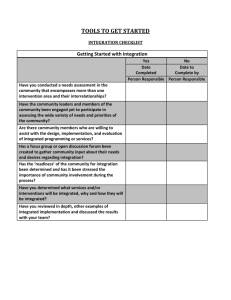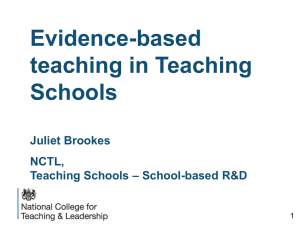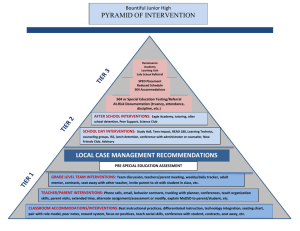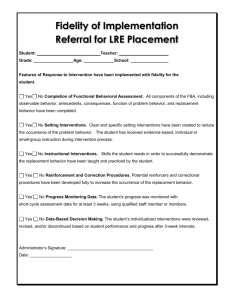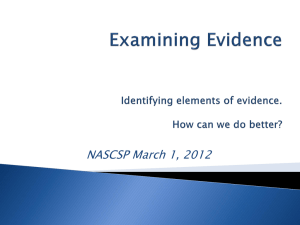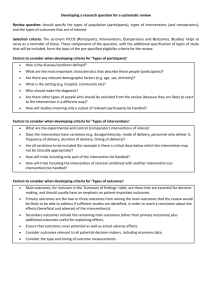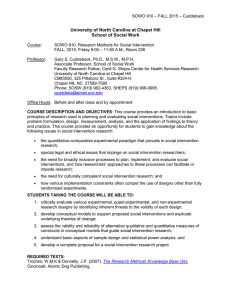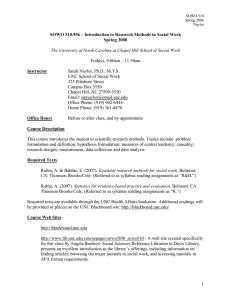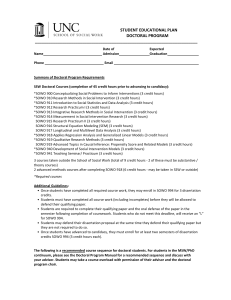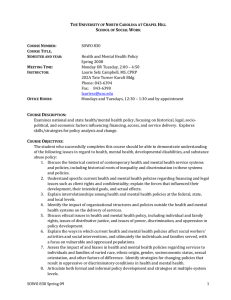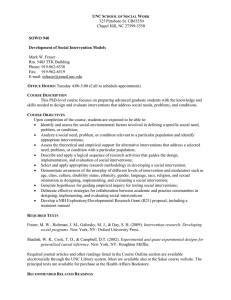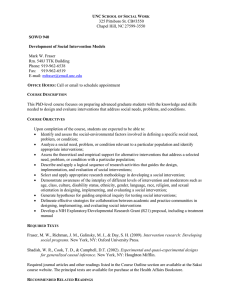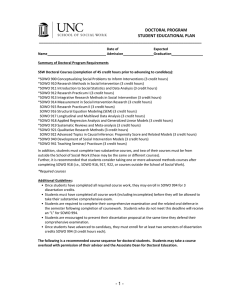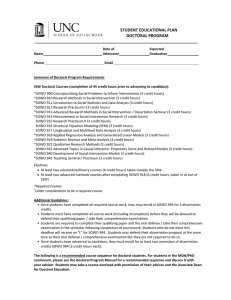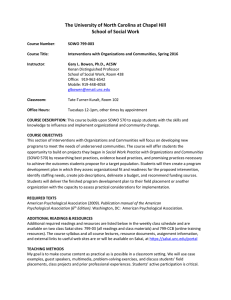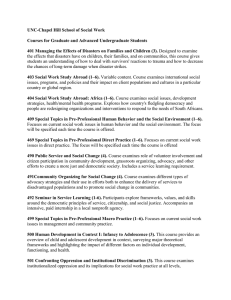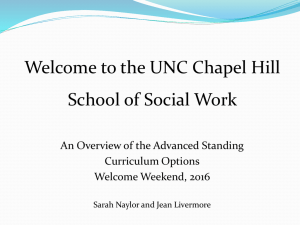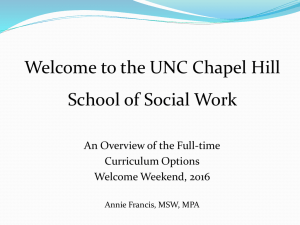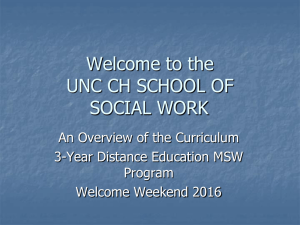Faculty descriptions and Foundation Courses
advertisement
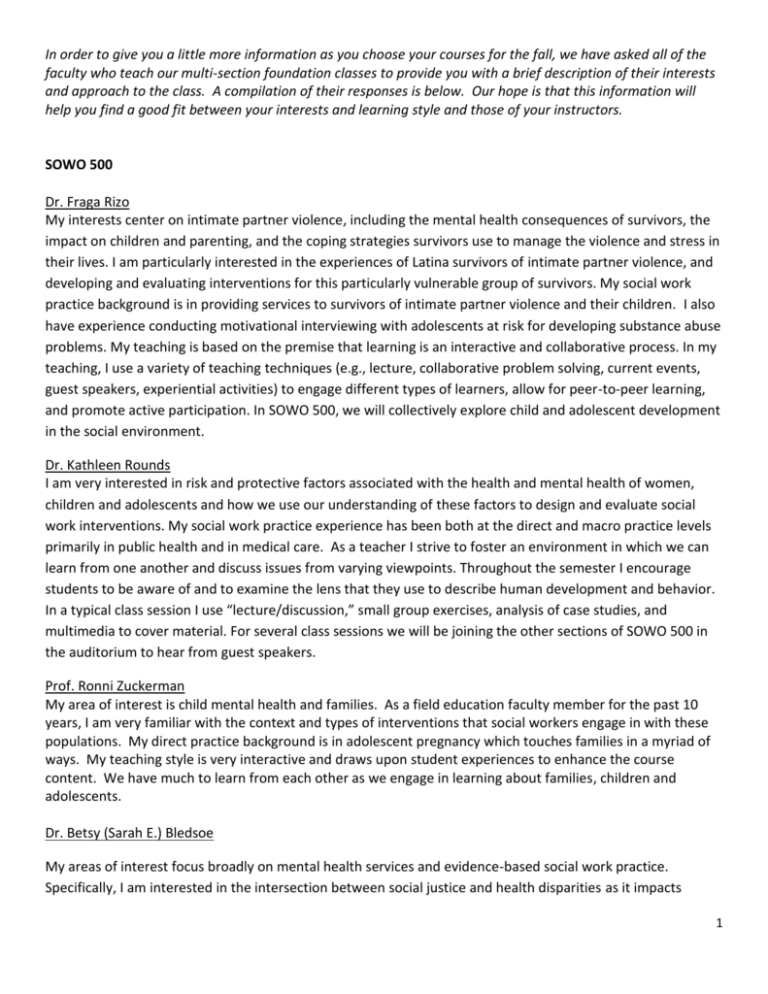
In order to give you a little more information as you choose your courses for the fall, we have asked all of the faculty who teach our multi-section foundation classes to provide you with a brief description of their interests and approach to the class. A compilation of their responses is below. Our hope is that this information will help you find a good fit between your interests and learning style and those of your instructors. SOWO 500 Dr. Fraga Rizo My interests center on intimate partner violence, including the mental health consequences of survivors, the impact on children and parenting, and the coping strategies survivors use to manage the violence and stress in their lives. I am particularly interested in the experiences of Latina survivors of intimate partner violence, and developing and evaluating interventions for this particularly vulnerable group of survivors. My social work practice background is in providing services to survivors of intimate partner violence and their children. I also have experience conducting motivational interviewing with adolescents at risk for developing substance abuse problems. My teaching is based on the premise that learning is an interactive and collaborative process. In my teaching, I use a variety of teaching techniques (e.g., lecture, collaborative problem solving, current events, guest speakers, experiential activities) to engage different types of learners, allow for peer-to-peer learning, and promote active participation. In SOWO 500, we will collectively explore child and adolescent development in the social environment. Dr. Kathleen Rounds I am very interested in risk and protective factors associated with the health and mental health of women, children and adolescents and how we use our understanding of these factors to design and evaluate social work interventions. My social work practice experience has been both at the direct and macro practice levels primarily in public health and in medical care. As a teacher I strive to foster an environment in which we can learn from one another and discuss issues from varying viewpoints. Throughout the semester I encourage students to be aware of and to examine the lens that they use to describe human development and behavior. In a typical class session I use “lecture/discussion,” small group exercises, analysis of case studies, and multimedia to cover material. For several class sessions we will be joining the other sections of SOWO 500 in the auditorium to hear from guest speakers. Prof. Ronni Zuckerman My area of interest is child mental health and families. As a field education faculty member for the past 10 years, I am very familiar with the context and types of interventions that social workers engage in with these populations. My direct practice background is in adolescent pregnancy which touches families in a myriad of ways. My teaching style is very interactive and draws upon student experiences to enhance the course content. We have much to learn from each other as we engage in learning about families, children and adolescents. Dr. Betsy (Sarah E.) Bledsoe My areas of interest focus broadly on mental health services and evidence-based social work practice. Specifically, I am interested in the intersection between social justice and health disparities as it impacts 1 maternal and child mental health and wellbeing in low-income and racial/ethnic minority populations with a strong focus on adolescent mothers and their children. My most recent work is focused on the neurodevelopmental impact of early trauma on subsequent mental health. I have clinical practice experience working in women’s and children’s shelters and in community mental health focusing on mood, anxiety, and trauma related disorders. I have advanced expertise in interpersonal psychotherapy and motivational, DSM diagnostic, and engagement interviewing. My teaching philosophy follows a feminist pedagogy with a focus on participatory learning and the development of critical thinking and open minds through the validation of personal experience and encouragement of social understanding and activism. We will approach human development through this lens. SOWO 530 Dr. Iris Carlton-LaNey My research interests focus on social justice, policy and policy practice. I am particularly interested in how policies affect people locally and on a daily basis. I have served on local county social services boards and have chaired the board in Durham County. This has allowed me to see the interplay between policies, local politics, social service delivery, and social work. I also study the lives of elderly rural women and the ways that public policies affect their lives and their coping. This course will examine public policies from a social justice perspective. The course structure encourages discussion and analyses of policies with an examination of societal values, social justice, and systemic interplay. Dr. Paul Lanier My research and practice has focused on interventions that promote child well-being and strengthen families, particularly among vulnerable populations. I am interested in improving the quality and availability of evidence-based services provided across child welfare, health, and mental health systems. My goal for this course is to provide an opportunity to build an understanding of current policies that impact the provision of social services and also to develop practical policy analysis skills social workers need to serve clients and realize social change. I also hope to bridge the historical roots of social work in advocating for policy change with the growing emphasis on evidence-based policy. Dr. Rain Masa My research focuses on economic and social determinants of health, with a focus on food security and HIV particularly among most-at-risk populations. I am interested in developing and improving evidence-based programs that promote economic security and foster positive health outcomes for individuals and families. My social work practice background is in program management and implementation of economic programs to inform innovations in policy and practices for lower income populations. Recognizing that learning styles are unique to each student, I use various methods (e.g., lecture, small group activities, guest speakers, role plays, simulation exercises) to accommodate and facilitate student learning. I am also a proponent of active learning and encourage student interaction and peer-to-peer learning. For this course, we will critically examine the origin and development of social welfare policies and how these policies shape patterns of social service provision. 2 SOWO 540 Dr. Kim Strom-Gottfried My direct practice background is in mental health (particularly emergency mental health such as crisis and suicide work). I also have expertise in group work and volunteer as a co-leader of bereavement groups for people who have lost loved ones to suicide and homicide. My research is in ethics and the variety of dilemmas that can occur when we try to apply professional standards to novel situations such as home visits, rural communities, social networking, etc. I take a very applied approach to this practice class, using role plays, cases, videos, exercises and discussions to build on the reading students have done. The assignments are generally the same for all sections, though mine include 2-4 short multiple-choice quizzes on the readings to help prepare students for the social work licensure exam. Prof. Marty Weems My area of interest is direct and clinical practice regarding: substance use disorders in adults, mental illness in adults, co-occurring disorders, crisis intervention. I am also particularly interested in evidence-based practices and have expertise with CBT and Motivational Interviewing. I have an engaged teaching style and encourage a cooperative academic environment that allows students to discuss and explore ideas. I have an informal and engaging teaching style; and I try to provide a lot of diversity in teaching method. Thus I often use lectures, multimedia, interactive exercises, small group work, and my experiences outside of the classroom as a catalyst for learning. This course provides the students’ first exposure to the fundamentals of direct practice social work. Each class tends to focus on one or two key concepts. These include, but are not limited to: social work values, Code of Ethics, communication skills, building empathy, assessment, group work…etc. Students are expected to use their field experiences as a tool to apply their learning. Dr. Amy Blank-Wilson My direct practice experience includes work in the child welfare, juvenile justice, mental health, and criminal justice systems. My primary area of interest as a practitioner and researcher is the provision of services to people with serious mental illnesses, particularly those involved in the criminal justice system. I have expertise in the use of CBT for individuals with Schizophrenia and I have worked for a number of years in crisis and emergency mental health services. My research focuses on the intersection of the mental health and criminal justice system. It involves projects designed to improve the delivery of services to people with serious mental illnesses involved in the criminal justice system and the development of new interventions in this area. My practice classes are active learning environments where students and I work together to learn and engage new skills. To facilitate this process I use a number of instructional tools including lectures, classroom discussions, and examples from the field, role plays, interactive exercises, case studies, and video demonstrations. Dr. Latoya Small My background as both a practitioner and researcher has centered on addressing disparities in health and mental health needs for low-income women and children at the local and international level. I primarily focus my work at the intersection of HIV, mental health, and behavioral health within the context of poverty. I will use various modalities including lectures, discussions, small group work, exercises, and videos to integrate social work practice with theory, and help students develop generalist social work practice skills. This class will incorporate interactions between systems and clients, to better understand contextual factors influencing our 3 work. In this approach, students will be encouraged to consider the complexity of working with diverse populations. I will also be addressing the divide and overlap between research and practice facing health and mental health service providers today. SOWO 570 Prof. Tonya VanDeinse My broad area of interest is adults with mental illness and macro-level interventions. My research and macro practice experiences are in implementing interventions targeting adults with severe mental illness who are involved in multiple service systems (e.g., criminal justice system, homeless services, psychiatric hospitals, domestic violence services). I am particularly interested in how real-world implementation factors impact intervention effectiveness. In the classroom I use a variety of methods to accommodate diverse learning styles such as group work, interactive and didactic lectures, facilitated discussions, videos, case studies, and guest speakers. I also like to integrate the field, professional, and volunteer experiences of students during class and I encourage students to actively think about the intersection of macro social work and direct practice. Prof. Travis Albritton My research interests focus on academic achievement and Black male students. I am particularly interested in understanding how Black males determine what it means to be smart and how their understandings of what it means to be smart impacts their academic identity. My practice experience is in the area of child welfare. I have worked in both case management and foster care and I have served as a children’s service supervisor, where I supervised a blended team that consisted of foster care, case management and investigative social workers. My teaching style involves the use of class and individual group discussion, lecture, multi-media and experiential learning. I intentionally use different methods of instruction and assessment in my classes because a “one size fits all” approach is ineffective for a diverse group of students. I work to create a classroom environment that encourages the exchange of multiple ideas and viewpoints and I welcome honest and critical dialogue about issues of diversity and social justice. 4

